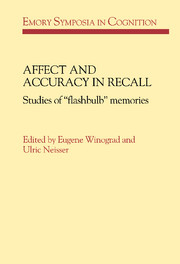Book contents
- Frontmatter
- Contents
- Preface
- List of contributors
- 1 Introduction
- Part I Empirical studies
- Part II Developmental studies
- 5 Developmental issues in flashbulb memory research: Children recall the Challenger event
- 6 Preschool children's memories of personal circumstances: The fire alarm study
- Part III Emotion and memory
- Part IV Theoretical issues
- Author index
- Subject index
5 - Developmental issues in flashbulb memory research: Children recall the Challenger event
Published online by Cambridge University Press: 22 March 2010
- Frontmatter
- Contents
- Preface
- List of contributors
- 1 Introduction
- Part I Empirical studies
- Part II Developmental studies
- 5 Developmental issues in flashbulb memory research: Children recall the Challenger event
- 6 Preschool children's memories of personal circumstances: The fire alarm study
- Part III Emotion and memory
- Part IV Theoretical issues
- Author index
- Subject index
Summary
Following the appearance of the now classic paper on “flashbulb” memory by Brown and Kulik (1977), Winograd and Killinger (1983) conducted a retrospective developmental study of the phenomenon. In reviewing Brown and Kulik's (1977) data, they noted that 24 of the 80 informants had been between 7 and 11 years of age at the time (1963) of the Kennedy assassination, yet their reports of the circumstances under which they discovered the news were no different from those informants who were adults at the time. A similar pattern was noted by Yarmey and Bull (1978), who found that only 15% of their subjects who had been between 6 and 10 years old in 1963 responded that they could not remember what they had been doing at the time they heard of Kennedy's assassination. Apparently, age at the time of encoding had little relation to subsequent recollections of the event's discovery. Winograd and Killinger (1983) thus set out to determine whether there were any differences between the memories of those who had been 7 or older at the time of the event versus those who had been younger. If age differences emerged, perhaps they could shed some light on both the development of autobiographical memory in general and the factors that contribute to flashbulb memories.
Winograd and Killinger (1983) collected questionnaires from 338 college students who had been 1 to 7 years old at the time of John F. Kennedy's assassination.
- Type
- Chapter
- Information
- Affect and Accuracy in RecallStudies of 'Flashbulb' Memories, pp. 95 - 120Publisher: Cambridge University PressPrint publication year: 1992
- 18
- Cited by

